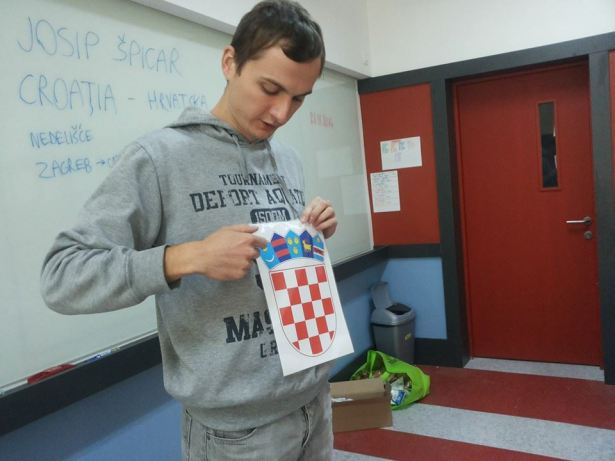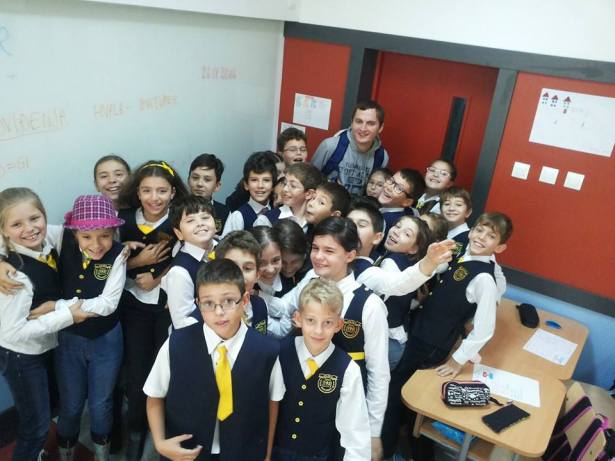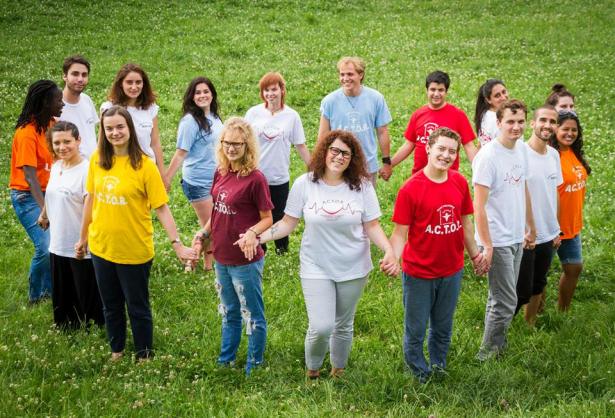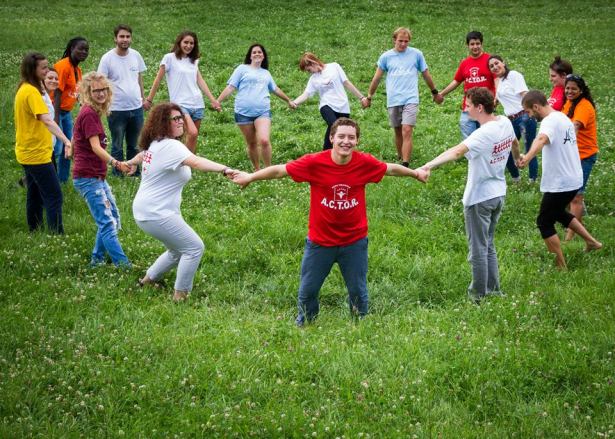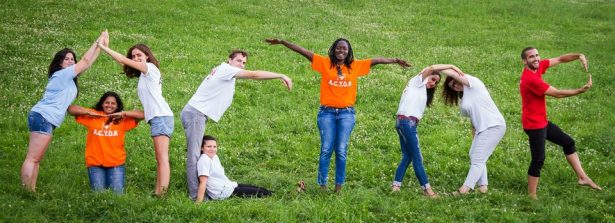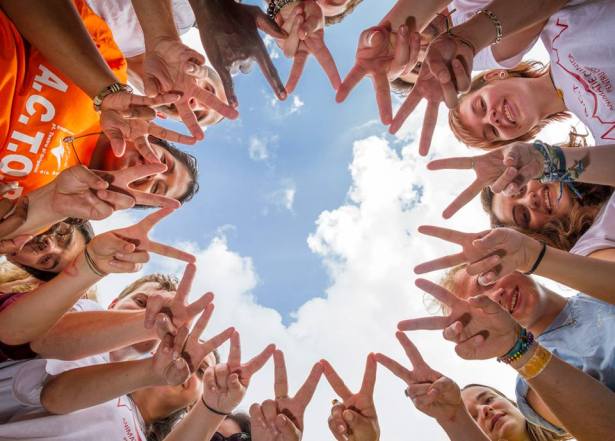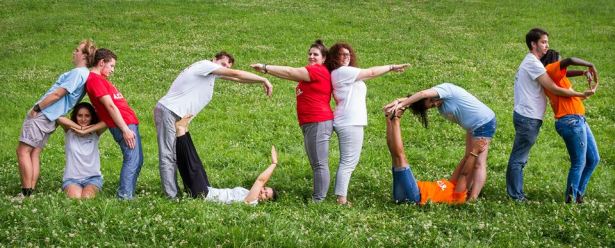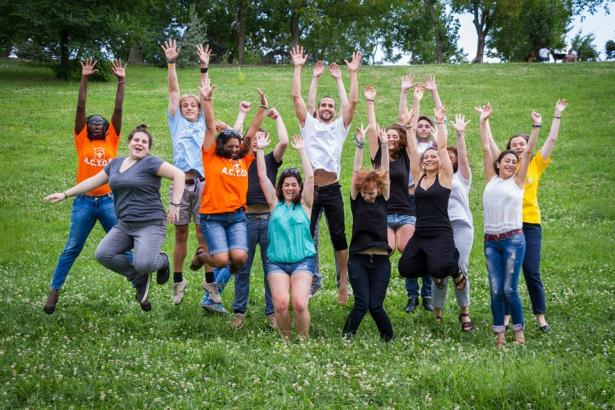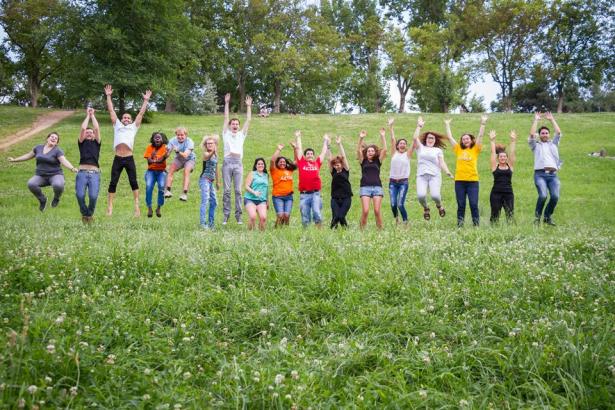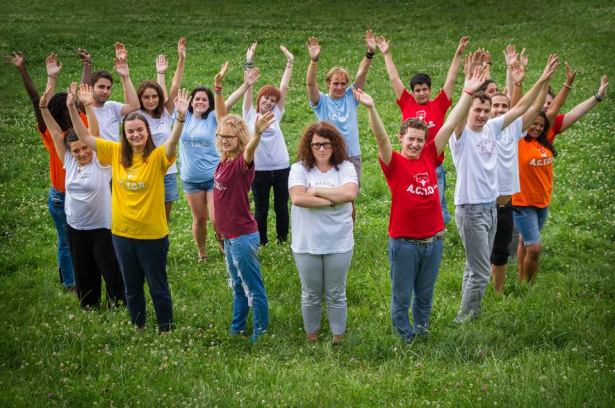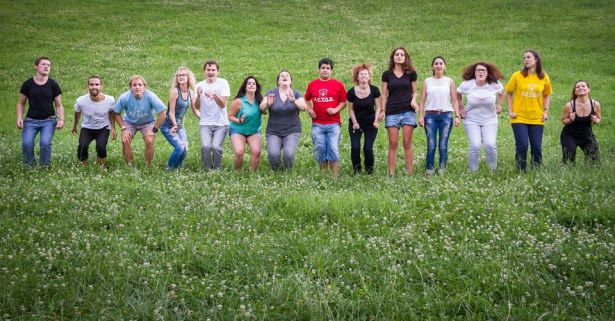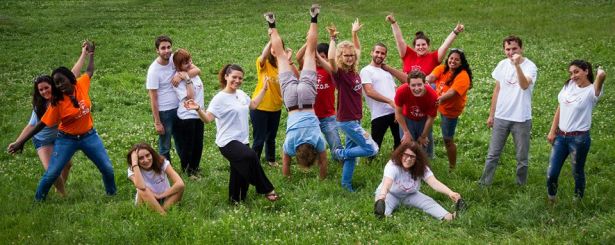http://www.josipevs.wordpress.com
Thoughts and Experiences
LINGUAFEST 2014
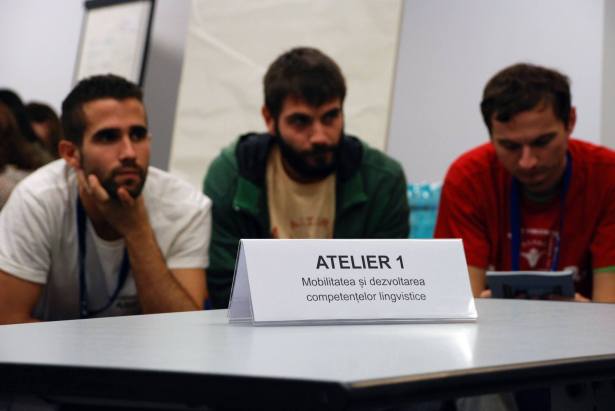 In Friday, October 17th, in Spaţiul Public European, 5 ACTOR’s and Ask Me EVS volunteers (Carlos, Alice, Tamo, Lorenzo & Josip) and an Erasmus Practice Student (Elvira Mačyte) participated in LinguaFest 2014. This festival is a lingual event that promotes interculturality , shows good examples of learning foreign languages and adaptations to new cultures, and gathers positive experiences of people living outside from their countries. Participants of LinguaFest are people of all age groups, education levels, genders & social statuses. Participants shared their experiences with each other and witnessed presentations about new projects from field of multilingualism and multiculturalism. Every year LinguaFest is held in different cities at the same time, and this year one of the cities was Bucureşti.
In Friday, October 17th, in Spaţiul Public European, 5 ACTOR’s and Ask Me EVS volunteers (Carlos, Alice, Tamo, Lorenzo & Josip) and an Erasmus Practice Student (Elvira Mačyte) participated in LinguaFest 2014. This festival is a lingual event that promotes interculturality , shows good examples of learning foreign languages and adaptations to new cultures, and gathers positive experiences of people living outside from their countries. Participants of LinguaFest are people of all age groups, education levels, genders & social statuses. Participants shared their experiences with each other and witnessed presentations about new projects from field of multilingualism and multiculturalism. Every year LinguaFest is held in different cities at the same time, and this year one of the cities was Bucureşti.
In first part of the event, Ministry of Education of Romania representatives together with other official personnel ceremonially opened LinguaFest and presented both foreign languages projects in Romania and projects related to the foreigners living and learning in Romania. After, two high school students presented their experience from student exchange in Spain, where they learned about Spanish language and culture. They said that was hard to communicate with people that don’t understand your language and you don’t understand theirs, but they learned how to do it through living with their Spanish peers and constant contact with Spanish people, what is basic way how to learn foreign language in praxis and one of the main messages of LinguaFest. Another project presented was shadow theater adaptation of Homer’s classical work “Odyssey” played by children.
In second part participants were divided into three groups and they were talking about their experience with Romanian and foreign languages, language learning process and living abroad. Languages that were mentioned and used in discussion were Romanian, English, Spanish, Italian and Romani. Participants were from countries all over the world. After the lunch break pupils awarded on national foreign languages competitions were reading translations of Homer’s “Odyssey” on English, French, Hungarian, Italian, Spanish, Polish and German.
In the last part participants were able to learn more about how to find a job, write perfect CV and motivation letter, and which things should they avoid while referring to the employers. Next step was workshop about recognizing personal skills, superpowers and abilities necessary for project implementation.
In 8 hours of LinguaFest we learned a lot both about experience of other foreigners in Romania and about Romanians abroad, and found out that people are going to similar processes while living in new culture as I do, so I could relate to them. Sentence of one of the participants during discussion in groups remains in my mind as conclusion of this event: “Language is might not always very important, but it’s a first step to integration and knowing other culture.”
Lorenzo Falangone & Josip Špicar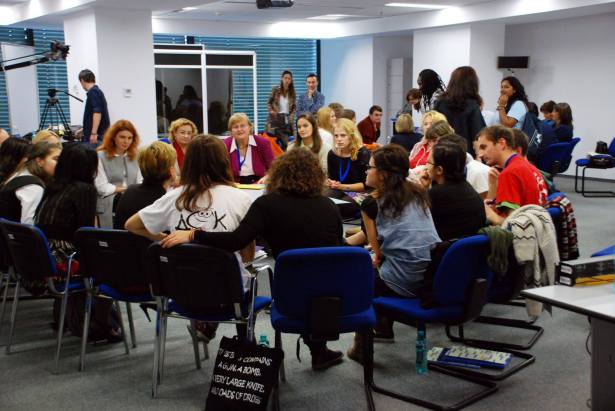
Vineri, 17. octombrie, la Spatiul Public European, 5 voluntari EVS ai ACTOR si Ask Me (Carlos, Alice, Tamo, Lorenzo & Josip) si un student Erasmus (Elvira Mačyte) au participat la LinguaFest 2014. Acest festival este un eveniment lingvistic care promovează interculturalitatea, exemple de buna învătare a limbilor străine si modalitati de adaptare la noile culturi si adună experientele pozitive ale persoanelor care locuiesc in afara tarii lor. Participantii LinguaFest sunt oameni de toate varstele, niveluri de educatie si stările sociale. Participantii si-au impartit experientele anterioare si au fost martori la diferite prezentări despre noile proiecte din domeniul multilingvismului i multiculturalitate. În fiecare an, LinguaFest are loc în diferite orase, în acelasi timp, si în acest an unul din orase a fost Bucuresti.
În prima parte a evenimentului, Reprezentantii Ministerului Educatiei împreună cu alti oficiali au deschis intr-o maniera ceremonioasa LinguaFest si a prezentat atat proiecte de limbi străine în România si proiecte legate de străinii care trăiesc si învată în România. Apoi, doi elevi de liceu au prezentat experienta lor de schimb de studenti în Spania, unde au învătat despre limba si cultura spaniolă. Ei au spus că a fost greu să comunice cu oameni care nu înteleg limba ta si tu nu o cunosti pe a lor, dar au învătat cum să facă acest lucru prin intermediul acestei experiente. Un alt proiect prezentat a fost o piesa de teatru de umbre – adaptarea operei clasice “Odiseea” de Homer, jucat de copii.
În partea a doua participantii au fost împărtiti în trei grupuri si au vorbit in limba romana, despre procesul de învătare a limbilor străine pentru cei care trăiesc si calatoresc în străinătate. Limbile care au fost mentionate si utilizate în discutie au fost limbile română, engleză, spaniolă, italiană si Romani. Participantii au fost din tări din întreaga lume.
În ultima parte, toti cei prezenti au participat la un ateloier in care au aflat mai multe despre modul în care pentru a găsi un loc de muncă, scrierea potrivita a unul CV si s scrisoarii de motivare, si cateva lucruri pe care ar trebui să le evitam cand cautam un loc nou de munca. Următorul pas a fost atelier de lucru cu privire la recunoasterea competenselor personale, super-puteri si abilităti necesare pentru a castiga un nou loc de munca potrivit asteptarilor si nevoilor noastre.
În 8 ore petrecute la evenimentul LinguaFest am învătat multe, atât despre experienta altor străini în România si despre românii din străinătate, am aflat că oamenii traiesc procese de invatare similare cu ceea ce ni se intampla noua, în timp ce trăiesc într-o noua cultură. . Una dintre frazele spuse de unul dintre cei prezenti si care mi-a ramas in minte ca o concluzie a acestui eveniment: “Limba vorbita de un alt popor nu este întotdeauna foarte importantă, dar este un prim pas spre integrarea si cunoasterea altor culturi.”
Lorenzo Falangone & Josip Špicar
My First School Lesson
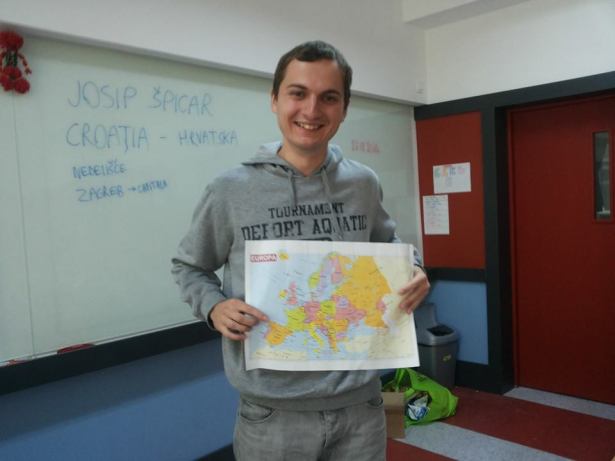 Here There volunteers started to give school & kindergarten lessons for this school year, and I am one of them, too. At the beginning, I was assistant on lessons of two older volunteers and one from my group, but in Friday, September 26th, time to prove myself came. I went to Scoala Gimnaziala 195 and held lesson alone, without assistant. The children in this class were group IV, what means that they are 10 years old. I prefer to work with bigger school children such as them, so I knew I will have really good lesson.
Here There volunteers started to give school & kindergarten lessons for this school year, and I am one of them, too. At the beginning, I was assistant on lessons of two older volunteers and one from my group, but in Friday, September 26th, time to prove myself came. I went to Scoala Gimnaziala 195 and held lesson alone, without assistant. The children in this class were group IV, what means that they are 10 years old. I prefer to work with bigger school children such as them, so I knew I will have really good lesson.
All volunteers in “Aici Acolo” program are teaching the children about their countries, cultures, customs and history, but I guess I’m the special case because I’m the first Croatian volunteer in history of the project, so children never had lessons about Croatian culture. They were enthusiastic for learning about country they don’t know anything about, what’s even more interesting because Croatia is nearby, there’s only Serbia between Romania and us.
I introduced myself in Romanian language, told them that I come from small village in northern Croatia. Children could see how my place and the biggest Croatian cities look like on photos that I showed them. I explained them the story behind Croatian flag, legend about chessboard on Croatian coat of arms and legend about foundations of Zagreb, Croatian capital. Since Zagreb means “to draw something”, in this example “to draw water from the well”, I teached children how to make origami can for drawing water from the well. Children also learnt about geography of Croatia, position on the map and I teached them some Croatian words and phrases. At the end we played quiz where they had to remember what does certain Croatian word means on Romanian language. We had fun, and competition was very tight.
Lesson was successful and I owe lots of thanks to professor Cătălina Ganea, who was very helpful and kind, just as her class is. I think I felt as same delight and enthusiasm about sharing cultural diversity as children did. If all children and lessons will be like this ones, then I will trully enjoy my entire EVS experience in Romania.
Josip Špicar
Voluntarii din proiectul Here There au inceput si in acest an lectiile despre diversitate culturala oferite copiilor si pedagogilor din gradinite si scoli, si printre acesti voluntari ma numar si eu. La inceput am asistat la lectiile unor voluntari cu mai multa experienta, dar vineri, 26 septembrie, a sosit momentul sa dovedesc ce pot. Prima lectie pe care am sustinut-o singur, fara ajutor, a fost la Scoala Gimnaziala 195. Copiii de aici sunt clasa a Iva ceea ce inseamna ca ei au 10 ani. Imi place sa lucrez mai mult cu cei de scoala, asa cum sunt ei, asadar stiam ca voi avea o lectie foarte buna.
Toti voluntarii din proiectul Here Thre ii invata pe copii intr-o maniera non-formala despre tara, cultura, obieceiurile si istoria lor, dar pare-se ca sunt putin special, fiindca sunt primul voluntar din Croatia din acest proiect, asadar copii nu au avut niciodata lectie despre cultura croata. S-au aratat foarte entuziasmati sa invete despre Croatia, mai ales ca nu aveau multe cunostinte despre ea, ceea ce si mai curios tinand cont ca tara mea este foarte aproape de Romania, despartindu-ne doar Serbia.
M-am prezentat copiilor in limba romana, le-am povestit ca vin dintr-un sat din nordul Croatiei. Copiii au putut vedea cum arata satul meu natal si cateva orase importante din Croatia prin intermediul fotografiilor pe care le-am prezentat. Le-am povestit istorioara din spatele steagului croat si legenda despre table de sah si despre stemele care apar pe drapelul nostru. De asemenea le-am relatat si legenda orasului Zagreb, capitala Croatiei. Plecand de la numele Zagreb care inseamna a scoate, in acest caz a scoate apa din fantana, i-am invatat pe copii sa faca o cana origami cu care sa scoatem apa. Copiii au invatat si despre geografia Croatiei, asezarea pe harta si de asemenea le-am spus si cateva cuvinte si propozitii in limba mea. La final ne-am jucat un concurs prin care elevii ghiceau ce inseamna anumite cuvinte croate in limba romana. Ne-am distrat si competitia a fost foarte stransa.
Lectia a fost una de succes si pentru asta datorez foarte multe multumiri profesoarei Catalina Ganea care a fost foarte saritoare si amabila, la fel ca si clasa ei. Daca toti copiii si lectiile vor fi asa, atunci intr-adevar voi avea parte de o experienta de voluntariat resuita in Romania.
Josip Špicar
Creative recycling with Marina
Un nou grup de voluntari ai proiectelor “Here There” si “Ask Me” a ajuns in Romania la inceputul acestei luni. Avem o multime de lucruri de invatat in aceste prime luni in Bucuresti, asa ca Marina Sanchez din Spania, una din voluntarii primului proiect, a facut un atelier pentru noi vizand educatia in scopul reciclarii creative a materialelor folosite.
Workshop-ul a tinut de la orele 12 la orele 14 ale zilei de Miercuri, 23 Iulie, in biroul pentru intalniri al A.C.T.O.R. Aici au participat 11 voluntari iar Marinane-a aratat niste fotografii cu exemple bune de reciclare a materialelor. Erau niste animale dragute desenate pe sulurile de la hartia igienica, lanturi si flori facute din dopuri si masini de jucarie pentru copii facute din sticle mari de plastic. Dupa ce ne-a aratat pozele, am avut timp sa lucram cu materialele aduse din apartamentele noastre, cutii de lapte, suluri, sticle mari si mici de plastic. Marina ne-a aratat cum putem face un portofel la moda din cutiile de lapte, iar apoi am incercat sa transformam o sticla de plastic intr-un instrument muzical. Am pus orez intr-o sticla printr-o palnie improvizata, urmand sa o scuturam si asta a fost. E un mod foarte usor de a crea un instrument pe care copiii s ail adore si cu care sa se joace. Am mai incercat si sa facem niste decoratii din hartie creponata pentru copii si un joc simplu de prins dopul in sticla.
Acest atelier a fost unul util pentru toti iar unii din noi deja au inceput sa aplice aceste metode de reciclat in activitatile lor cu copiii si chiar cu colegii de apartament. Consider ca am inteles un mesaj important Miercurea asta – natura e pretioasa si trebuie sa o ocrotim si astfel sa refolosim materialele care ne permit sa o facem. In acest fel inlocuim folosul de baza al unor obiecte si ocolim crearea altor deseuri.
A new group of EVS volunteers from projects “Here There” & “Ask Me” arrived in Romania at the beginning of this month. We have a lot to learn in these first months of their staying in Bucharest, so Marina Sanchez from Spain, one of the old volunteers, made a special workshop for us – education on creative recycling of used materials.
The workshop was held between 12 and 2 PM on Wednesday, the 23rd July, in A.C.T.O.R.’s meeting office. 11 volunteers participated in this workshop. Marina showed us photos with good examples of how to re-use some materials. There were nice animals drawn on simple toilet paper cylinders, necklaces and flowers made out from plugs of bottles, and cars suitable for children games made from large plastic bottles. After the presenting these photos, we had to practice on materials we brought to workshop from our flats – milk tetras, toilet paper cylinders, small & large plastic bottles. Marina showed us how to make a very fashionable wallet from milk tetra, then we tried our hands in making a musical instrument out of a plastic bottle. We put rice in a bottle through an improvised funnel, shake it – and it’s already done! In this way you can easily create an instrument which children will adore and like to play with. We also practiced on stretchy paper decoration for kids and on a simple game of catching the bottle plug in a bottle.
We all found this workshop very useful and they already used some of the recycling methods for their activities with children, but also for their households. I think that we learned an important message on Wednesday – our nature is precious and we have to protect it, so we should re-use all the materials that provide us this feature. In this way we are not creating additional trash and we use available resources in many more ways than their basic purpose.
by Josip Špicar
Workshop at gradi 149
Pe data de 18 iunie 2014, cativa voluntari au tinut un atelier special cu copiii care merg la gradinita 149, aflata foarte aproape de Piata Sudului. La ora 6, cativa parinti foarte amabili ne-au condus la locul in care atelierul avea loc.
Sentimentul de a fi aproape de ei a fost unul foarte placut. Acestia puteau vorbi diverse limbi, (romana, engleza, franceza si germana), purtand conversatii foarte interesante datorita faptului ca sunt romani la origine, dar care locuiesc in Elvetia, astfel avand multe povesti amuzante de impartasit si de comparat ; ne-au explicat si diferentele dintre cele doua tari.
Din pacate, traficul din Bucuresti in acel interval este foarte aglomerat, ceea ce a cauzat intarzierea noastra, pierzand astfel inceputul serbarii. Am ajuns intr-un fel de camera de petreceri pentru copii. Erau tot felul de lucruri pentru distractia copiilor, cum ar fi trambuline, biliard, muzica si baloane.
Asadar am facut cateva dansuri si jocuri cu copiii pentru a sarbatori sfarsitul anului scolar. Copiii au fost foarte incantati si s-au distrat de minune. Profesorii si parintii pareau de asemenea sa se distreze in ciuda oboselii provocate de agitatia copiilor.
A fost un mod foarte placut de a termina anul scolar pentru copii si ne-am si distrat.
On the 18th June 2014, some volunteers had had a special workshop with children who are going to kindergarten 149, situated close to Piata Sudului. At 6 p.m, a very kind couple of parents picked us from this place with their car to join the place where this workshop was taking place.
The feeling of being next to the parents was very good. They were able to speak several languages (Romanian, English, French, german) and they had very interesting conversations because they are native romanian living in Switzerland and so they had very funny stories to tell us about life in these two places, differences between this two countries…
Unfortunately, the trafic of Bucharest at this time was completely crowded and we were late, not managing to assist to the beginning of the ceremony. We arrived in a kind of party room for children. There was everything for children to have fun (trampoline, pool, music, balloons).
So we made some dances and some games with children to celebrate the end of school year. Children were very happy and enjoyed a lot. Teachers and parents seemed joyfull but also very tired by all the chaos from children.
It was a very nice way to finish the school year for children and we enjoyed this so much !
by Celine Valin
Parada Ion Creanga
This Sunday morning wasn’t usual for the A.C.T.O.R. volunteers. We took part in the big parade organized by the ‘Ion Creanga’ Theater, dedicated to the kids from Bucharest. Our entrance wasn’t usual either, mostly because we have represented ourselves in the national costumes made of paper. The preparations took a few days during which we looked for the best way to transform the typical clothes from our countries into paper models. The whole idea was to show something special in a very simple and catchy way, and I think we did it quite well. The parade walked from Arcul de Triumf to the Peasant Museum and all along the road there were people watching us, taking pictures, kids smiling and pointing at us with the fingers. We must have looked pretty funny wearing the paper. The fact that we represent so many different countries made our team even more visible. At the end there was some time for a small workshop during which we have done some craft with the kids.
Puteti vedea si reportajul DigiTV, unde Sheila si Diana au dat interviu:
Dimineata aceasta de Duminica nu a fost una obisnuita pentru voluntarii A.C.T.O.R. Am luat parte la marea parade organizata de teatrul Ion Creanga, dedicate copiilor din Bucuresti. Intrarea noastra, de asemenea, nu a fost una obisnuita, deoarece ne-am prezentat in costumele traditionale, facute din hartie. Pregatirile au durat cateva zile, cautand cel mai bun mod de a transforma costumele populare in modele de hartie. Intreaga idee a fost sa aratam ceva special intr-un mod simplu si captivant, ceea ce cred ca am reusit sa indeplinim. Parada a fost o plimbare de la Arcul de Triumf la Muzeul Taranului Roman, pe marginile strazilor aflandu-se oameni care ne priveau, faceau poze, copii zambind si aratand spre noi. Trebuie sa fi aratat destul de amuzant purtand hartie, iar faptul ca reprezentam atat de multe tari a ajutat la o vizibilitate mai mare a grupului nostru. La sfarsit a fost organizat si un atelier mic, unde am avut timp sa facem niste.. mestesuguri cu copiii.
by Ola Biela
Codlea (5.06)
Am inceput dis-de-dimineata prin a merge la scoala, unde ne-am impartit in doua echipe. Am tinut activitati de 15 minute in doua clase. Fiind alaturi de Marina, am facut o treaba minunata impreuna. Ea a invatat copiii faimosul « baila chipi chipi » iar eu am facut cateva dansuri si jocuri traditionale, din tara mea. Erau foarte multi copii intr-o clasa iar vizita noastra cred ca a fost un mod foarte bun de a-i binedispune putin, dar si pentru a invata cate putin din culturile noastre.
Am mers, apoi, sa ii invatam pe adolescenti origami. Le-am aratat cateva modele origami si, evident, am vorbit cu ei. A fost o adevarata provocare, din moment ce ei nu vorbeau engleza. Astfel, a trebuit sa incercam sa le explicam cu cea mai buna exprimare in roman ape care o puteam utiliza. Am avut un pranz traditional foarte placut cu ei iar, imediat dupa asta, am plecat la Codlea, la centrul pentru copii si tineri cu diverse probleme. Prima data am facut cateva jocuri pentru a le oferi energia necesara, iar apoi le-am oferit baloane. Toti copiii iubesc baloanele. Apoi le-am dat si prajituri. In concluzie pot spune ca m-am bucurat de aceasta zi in afara Bucurestiului, plina de locuri noi. Abia astept sa am din nou sansa de a merge din nou si de a face ceva frumos pentru binele copiilor.
We started early in the Morning and firstly we went to one school where we split into two teams. We made activities for 15minutes in two classes. I was with Marina and we ,made a good job together. She teached the famous “baila chipi chipi” to children and I made a dance from my country along with some games. There were a lot of children In the classroom and I think our visiting was a good way to energize them a little bit as well as to get to know a little about other cultures.
Then we went to teach teenagers origami. We teached several origami shapes and also we communicated with them. It was a challenge since they did not speak english and we had to explain and talk as good as we could in romanian. We had very nice traditional lunch together and straight after we went to Codlea, the center for children and youngsters with some problems. Firstly we did some energizing games and then we gave balloons to them. All the children love balloons..And also we gave cookies. In conclusion I would say that I really enjoyed the day out of Bucharest filled with new spaces and I am waiting to have the opportunity to go again and do something rewarding and nice to children.
By Lumileid Halvin
Origami in Cismigiu
We went to the beautiful Cismigiu Park to make an origami workshop for children. There were also a lot of other attractions for children starting from clowns and dancing ending up with colouring activities. In our workshop there were plenty of children and it was very nice to teach them origami. We made for example dresses for princesses, flying colourful birds, magic cubes, well known planes, new style clocks, simple hearts and amazing flowers. I, for example, also learned some new origami. I enjoyed teaching some origami to children and it was really pleasing to see when the child finished the origami shape with pride and showed it to his mother. Origami is cool!
Am mers in frumosul parc Cismigiu pentru a tine un atelier de origami pentru copii. Erau, pe langa asta, multe atractii pentru copii, incepand de la clowni si dansuri, si pana la activitati de colorat. La atelierul nostru erau foarte multi copii si a fost foarte placut sa ii invatam modene. Am facut, de exemplu, rochii de printese, pasari multicolore, cuburi magice, binele-stiute avioane, inimi usoare si flori sublime. Eu una am invatat lucruri noi acolo. Mi-a facut placere sa invat copiii origami si mai ales sa le vad bucuria si mandria cu care le aratau mamelor lor modelul cand il terminau. Origami e super !
by Lumileid Halvin
Origami Workshop – Salvati Copiii
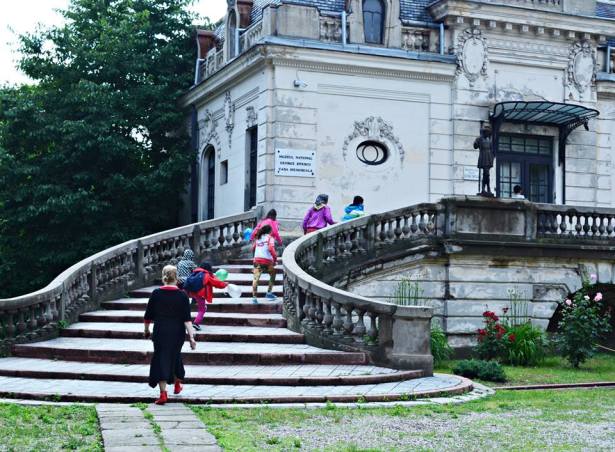 It doesn’t happen very often that we have a chance to work with kids who are not originally from Romania. This time was different, thanks to ‘Salvati Copiii’ who had invited A.C.T.O.R. volunteers to the Music Museum in Bucharest to do a workshop about the great Romanian composer George Enescu. We have worked with a group of kids from Middle Est who are now living in Romania, being the wards of the organization ‘Salvati Copiii’. Together with Diana from Peru, we prepared origami activities in which we attached the history of George Enescu, so the kids have not only learnt about the composer but also got to know an origami technique and some nice patterns, like violin or piano. We also had a moment to introduce ourselves and the countries from which we are and to play the typical games.
It doesn’t happen very often that we have a chance to work with kids who are not originally from Romania. This time was different, thanks to ‘Salvati Copiii’ who had invited A.C.T.O.R. volunteers to the Music Museum in Bucharest to do a workshop about the great Romanian composer George Enescu. We have worked with a group of kids from Middle Est who are now living in Romania, being the wards of the organization ‘Salvati Copiii’. Together with Diana from Peru, we prepared origami activities in which we attached the history of George Enescu, so the kids have not only learnt about the composer but also got to know an origami technique and some nice patterns, like violin or piano. We also had a moment to introduce ourselves and the countries from which we are and to play the typical games.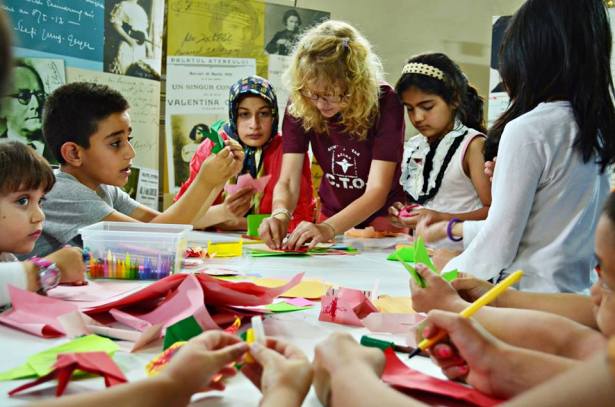 Nu se intampla foarte des sa avem sansa de a lucra cu copii care nu sunt de nationalitate romana. De aceasta data a fost diferit, multumita asociatiei Salvati Copiii, care a invitat voluntarii A.C.T.O.R. la Muzeul Muzicii din Bucuresti, pentru a face un atelier despre compozitorul roman George Enescu. Am lucrat, asadar, cu un grup de copii din Orientul Mijlociu care acum locuiesc in Romania, fiind acum sub tutela organizatiei Salvati Copiii. Impreuna cu Diana, din Peru, am pregatit activitati cu origami, in care am adaugat si istoria compozitorului, invatandu-I astfel o tehnica interesanta de modele frumoase, cum ar fi vioara sau pianul. Am avut, de asemenea, un moment in care ne-am prezentat pe noi si tarile din care venim, avand timp si de a face cateva jocuri traditionale.
Nu se intampla foarte des sa avem sansa de a lucra cu copii care nu sunt de nationalitate romana. De aceasta data a fost diferit, multumita asociatiei Salvati Copiii, care a invitat voluntarii A.C.T.O.R. la Muzeul Muzicii din Bucuresti, pentru a face un atelier despre compozitorul roman George Enescu. Am lucrat, asadar, cu un grup de copii din Orientul Mijlociu care acum locuiesc in Romania, fiind acum sub tutela organizatiei Salvati Copiii. Impreuna cu Diana, din Peru, am pregatit activitati cu origami, in care am adaugat si istoria compozitorului, invatandu-I astfel o tehnica interesanta de modele frumoase, cum ar fi vioara sau pianul. Am avut, de asemenea, un moment in care ne-am prezentat pe noi si tarile din care venim, avand timp si de a face cateva jocuri traditionale.
by Ola Biela

